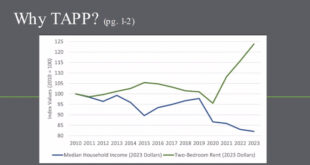FHA financing hinges on change to deed restrictions
Gunnison County is again finding itself in an unusual situation at Buckhorn Ranch. This time it is the dueling identities of the county, as both Stallion Park property owner and as the final authority, over the deed restrictions that govern the entire 24-unit complex in the subdivision south of Crested Butte.
This is the first time any kind of conflict has come up since the county purchased one of the units that was in foreclosure, making the county one of three property owners in the complex. Gunnison County owns a unit, one unit is owned by an individual, and developer Dick Landy owns the rest.
In an attempt to expand the number of owners and make financing available to people who want to buy, Landy submitted the paperwork and application to Federal Housing Administration (FHA) for access to financing.
Although the FHA doesn’t lend money directly to people, it insures and minimizes the amount of risk lenders face for borrowers putting a small down payment on a home. Then the FHA approves lenders to process the loans.
Housing Authority director KT Gazunis explained to the county commissioners that a developer usually gets an FHA lender on board before construction begins. The lender reviews plans and inspection reports before signing off on the project and making FHA financing available. Landy didn’t do that.
Instead, Landy has to jump through a series of hoops to secure the financing now that the condos are built. One of those hoops requires the FHA to review the deed restrictions on the condos, and the agency wants to make some changes.
The problem the FHA has with the deed restrictions that were developed by the Buckhorn Ranch homeowners association (HOA), and approved by the county, is that once a foreclosure starts on a property in the complex, the county does not have to immediately exercise its right of first refusal right away.
The right of first refusal would let the county step in before a foreclosure took place on a property at Stallion Park because the 24 units are part of the county’s Affordable Housing inventory.
The FHA wants to know if the county is going to exercise that right of first refusal before the FHA goes to the expense of starting the foreclosure process. That is a change that would have to take place in the deed restrictions.
So the county, as a Stallion Park property owner, has a vote with the HOA on whether or not the FHA is allowed to make the necessary changes to the deed restrictions. As the authority that has to approve changes to deed restrictions, the County Commissioners will then have a final say.
Commissioner Paula Swenson was the first to suggest the board stay out of the HOA vote, since it seemed to cause a conflict of interest with any decision the BOCC would have to make later. County manager Matthew Birnie didn’t think there was a legal conflict, but felt it was a policy matter the commissioners would have to deal with.
“We have the opportunity to say ‘No, [the deed restrictions are] what we approved, that’s what we want to stick to and that’s how we will vote,’” he said. But there is some benefit to offering potential condo buyers access to FHA financing.
Commissioner Hap Channell said he would be happy to have the option of FHA financing for potential buyers. What he didn’t like was changing the provision in the deed restrictions that gives the county its enforcement authority if the rules aren’t followed.
That change, Channell said, would “remove the ability to nullify a conveyance if it is not in compliance with the deed restriction. That’s one of my concerns. It’s a Catch-22. I agree that expanding the borrowing opportunities of the public to include FHA financing is a good thing. But, it would mean that we would be giving up the ability to nullify a conveyance, i.e. a resale, if it’s not in compliance with the deed restrictions. So they can ignore the deed restrictions.”
Gazunis agreed, saying it was a “serious concern” but pointed out that the county hasn’t always been told when a property is foreclosed on. “[The provision] has existed in all of these other deed restrictions and not taken care of it. That’s part of the problem.”
Channell agreed that not knowing about foreclosures was a problem, but he was still concerned about letting the county give up the right of first refusal and allowing properties that were deed restricted go up for sale without restrictions.
“Over the last several years, we have been about trying to build inventory, or trying to plug holes where inventory has been reduced by these kinds of things,” he said. “The dilemma is the balancing act between trying to expand the borrowing capabilities of people through FHA versus the fact that by doing so we would be giving up some of our regulatory authority over whether these remain in the affordable housing pool or not.”
As property owners, the commissioners voted to abstain from the HOA vote on whether to allow the FHA to change the deed restrictions. The BOCC will have to approve any changes to the deed restrictions before they are finalized.
 The Crested Butte News Serving the Gunnison Valley since 1999
The Crested Butte News Serving the Gunnison Valley since 1999



